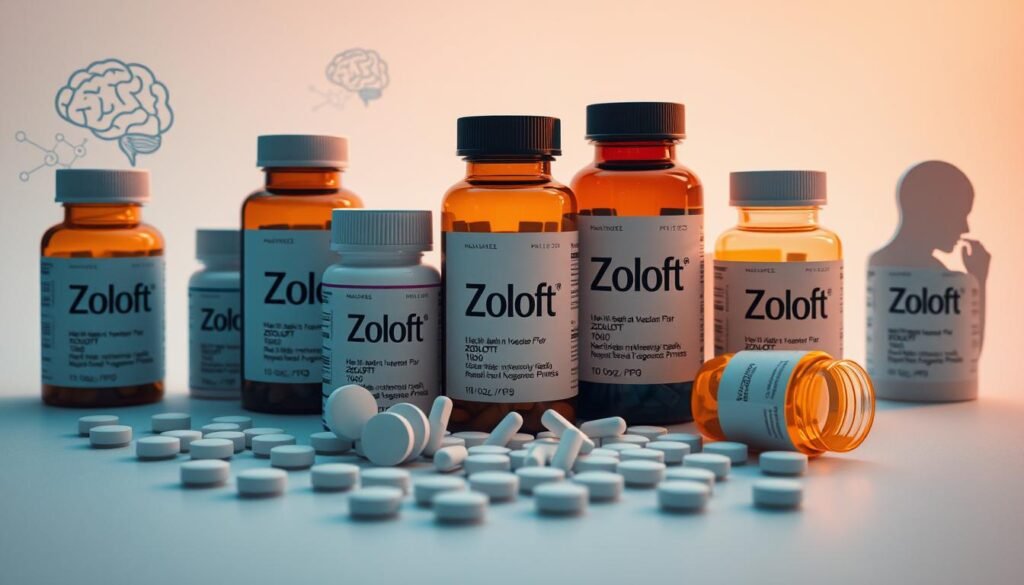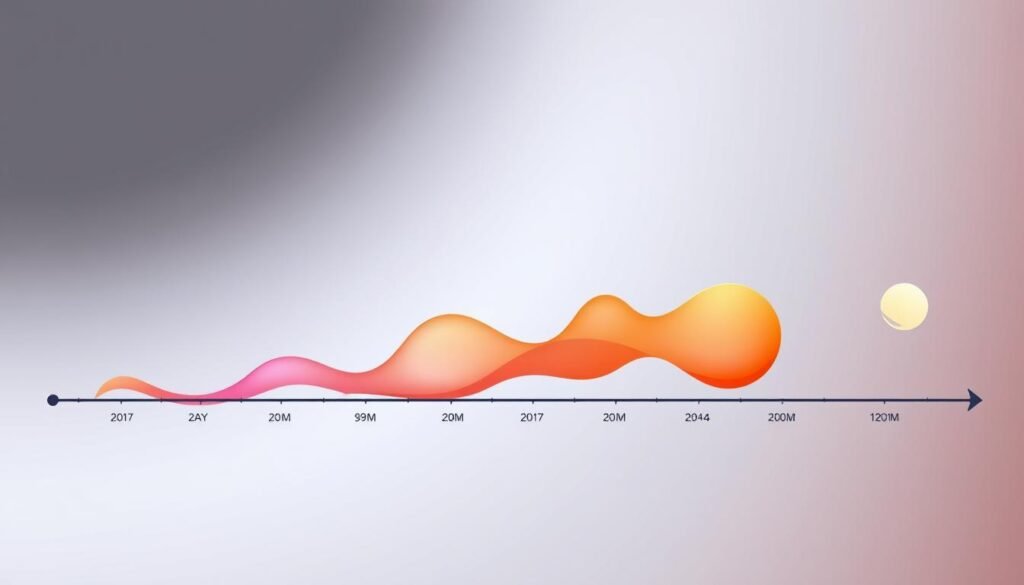About 10% of people on sertraline, known as Zoloft, might feel tired as a side effect. It’s surprising and important for those on this antidepressant to know. Zoloft helps with different mental health issues like depression and social anxiety.
While it’s a crucial aid for many, knowing how long you might feel tired on Zoloft is key. Each person’s experience with side effects, like fatigue, can vary. Duration of fatigue on Zoloft depends on several factors. We will look into how long the tiredness lasts, what affects it, and how to handle it.
Key Takeaways
- 10% of individuals taking Zoloft may experience drowsiness.
- Fatigue can onset at the beginning of treatment and may improve over the initial weeks.
- The variation in Zoloft fatigue duration depends largely on the individual’s response to the medication.
- There are several strategies available to manage Zoloft-related fatigue.
- It’s important to regularly consult a healthcare provider about side effects experienced.
Understanding Zoloft and Its Uses
Zoloft, also known as sertraline, is crucial in treating mental health issues. It’s a drug called a selective serotonin reuptake inhibitor (SSRI). It’s widely used for depression, anxiety, panic attacks, and OCD. Zoloft works by increasing serotonin in the brain, which helps control emotions and mood. Knowing how Zoloft works is important for anyone considering it.
Zoloft is an antidepressant that slowly starts to work, usually between two to six weeks. This slow progress is good for people with ongoing symptoms. It helps them reach a more balanced emotional state. However, it’s important to know that side effects like feeling tired or sleepy can happen.
Some people taking Zoloft might notice changes in their sleep, especially during the REM stage. These changes might cause tiredness and impact daily activities. This is especially true for those with chronic fatigue syndrome (CFS).
Besides treating depression, Zoloft is also used for other conditions. It can help with post-traumatic stress disorder (PTSD), social anxiety, and various phobias. Knowing the wide range of Zoloft’s uses can help patients find the best treatment for their mental health issues.
| Zoloft Uses | Conditions Treated | Common Side Effects |
|---|---|---|
| Antidepressant | Depression | Fatigue |
| Anxiolytic | Generalized Anxiety Disorder | Drowsiness |
| OCD Treatment | Obsessive-Compulsive Disorder | Nausea |
| Panic Disorder | Panic Disorder | Headache |
| PTSD Therapy | Post-Traumatic Stress Disorder | Dizziness |
What is Zoloft?
Zoloft, or sertraline, is a medication for treating depression and anxiety. It’s part of the SSRIs, which help with mood. It works by increasing serotonin in the brain, which plays a big role in how we feel.
Many people find relief with Zoloft, but it can cause side effects like feeling tired. Around 10% of users feel sleepy, mostly in the first few weeks.
Zoloft might affect your REM sleep, which is important for feeling rested. This can make tiredness worse for some, especially if they already are dealing with conditions like chronic fatigue syndrome. Even so, Zoloft usually causes less tiredness than other antidepressants like Paxil.
Users of Zoloft might also feel nausea, headaches, dizziness, and an upset stomach. They could feel agitated or irritable too. Despite these side effects, Zoloft can help increase energy by treating depression.

Common Side Effects of Zoloft
People who take Zoloft for depression, anxiety, OCD, PTSD, or PMDD may face common side effects. Fatigue is a major concern, affecting 10% to 16% of users. It can lower life quality, hurt work performance, and add to discomfort.
Other frequent side effects are nausea, dry mouth, changes in sex drive, diarrhea, excessive sweating, and tremors. Drowsiness, a form of fatigue, requires caution, especially when driving. Drinking alcohol can worsen these effects.
Often, fatigue appears in the early stages of treatment. This time is about getting used to the medication. To handle this fatigue, changing when you take the medication, staying active, and good sleep are advised.
Talking to healthcare providers is key. It helps manage side effects better and supports the treatment process. For more tips on dealing with fatigue from Zoloft, check out this resource.
Duration of Fatigue on Zoloft
If you’re starting Zoloft, knowing about fatigue can help. Many people feel tired when they begin this medication. This fatigue is part of getting used to the drug, a type called a selective serotonin reuptake inhibitor. It’s key to understand how long fatigue lasts and what affects this time.
How Long Does Fatigue Last?
Fatigue from Zoloft differs for everyone. It can last a few days to weeks. Early on, fatigue might feel stronger, especially first few weeks. As your body adjusts, you might start feeling less tired.
Timeline of Zoloft Fatigue Duration
To give a clearer idea, here’s a timeline:
| Time Frame | Fatigue Symptoms |
|---|---|
| Week 1 | Fatigue may be prominent; many report drowsiness and lethargy. |
| Weeks 2-4 | Fatigue often begins to decline as the body adjusts. |
| After 4 weeks | Many experience significant improvements; fatigue can still vary based on dosage and individual response. |
Higher doses and other health issues might extend feeling tired. How your body processes the drug also plays a role. Knowing this timeline helps you know what to expect. It’s also important to keep talking to your doctor about what you’re feeling.

Why Does Zoloft Cause Fatigue?
Zoloft fatigue is an important topic when discussing mental health treatment. Various reasons can make people feel tired while taking this medication.
The Role of Serotonin in Fatigue
Zoloft works by keeping more serotonin in the brain. Serotonin helps control mood but can also make you feel tired. About 10% of those who take Zoloft start feeling sleepy.
Compared to some other medications like Paxil, Zoloft is less likely to affect your energy. However, this tiredness from Zoloft usually gets better after a few weeks.
Impact of Sleep Problems
Sleep problems can also lead to Zoloft fatigue. Insomnia is a frequent side effect, which makes good sleep hard. This can cause you to feel sleepy during the day.
Dealing with sleep troubles and Zoloft-induced fatigue can be hard at first. But, practicing good sleep habits and talking to doctors can help make it easier.

| Fatigue Factors | Details |
|---|---|
| Serotonin Regulation | Zoloft inhibits serotonin reabsorption, increasing levels in the brain. |
| Fatigue Incidence | About 10% of patients may experience drowsiness; effects usually improve over weeks. |
| Sleep Issues | Insomnia and other sleep disturbances commonly occur with Zoloft use. |
| Managing Fatigue | Practicing good sleep hygiene and consulting with healthcare providers are helpful. |
Who is Affected by Zoloft Fatigue?
Some people feel affected by Zoloft fatigue more than others. It’s useful for patients and doctors to know this. While Zoloft helps many, it can make some people tired. This tiredness comes from several factors.
Age is a big factor. Older people might feel more tired because their bodies process drugs differently. And, if someone has health issues like chronic fatigue or sleep problems, Zoloft could make them feel more tired.
Other medicines can also play a role. For instance, drugs that make you sleepy can add to Zoloft’s fatigue. There are also differences between men and women. Men might feel tired due to side effects like erectile dysfunction. Women may get tired and also have mood swings or lose interest in sex.
Doctors need to watch patients closely, especially those who are at higher risk. Knowing who might get more tired from Zoloft helps doctors care for their patients better. This approach improves treatment for everyone.
| Demographic Factor | Increased Risk of Fatigue |
|---|---|
| Age | Older adults |
| Pre-existing Health Conditions | Chronic fatigue syndrome, sleep disorders |
| Concurrent Medications | Those with sedative effects |
| Gender | Different experiences related to sexual side effects |
Managing Fatigue When Taking Zoloft
Fatigue is common for people on Zoloft. There are ways to manage this fatigue and keep well. Adjusting when you take your medication, adding exercise, and better sleep can help boost your energy.
Adjusting Your Medication Schedule
When you take Zoloft can make a big difference. Taking it at night might reduce tiredness during the day. This lets you make the most of your time awake. Talking with a health expert can help find the best time for you. It’s a good step for lessening fatigue.
Incorporating Exercise and Sleep Hygiene
Regular exercise fights off feelings of being tired. It improves your mood and ups your energy. Aim for a walk or similar activity for 30 minutes each day to battle fatigue.
Good sleep habits are key too. Try to sleep and wake at the same times every day. Making your bedroom relaxing, cutting down screen time before bed, and sleeping 7-8 hours can improve your sleep. Better sleep means less fatigue.
Effective strategies for managing fatigue make a big difference. They show how important it is to take charge of your health on Zoloft.
| Strategy | Description |
|---|---|
| Medication Schedule Adjustment | Taking Zoloft in the evening may lessen daytime fatigue. |
| Regular Exercise | Engaging in moderate aerobic activities boosts energy levels. |
| Sleep Hygiene | Establishing a consistent sleep routine improves sleep quality. |
Coping Strategies for Zoloft Fatigue Duration
Feeling tired on Zoloft can be tough. But, you can make changes in your daily life to help. These tips are designed to help those dealing with tiredness from Zoloft.
Healthy Lifestyle Changes
Making healthy changes in your lifestyle can make you feel better. Eating well is key to having more energy. Here are some tips:
- Hydration: Drink plenty of water. Not drinking enough can make you feel more tired.
- Nutrition: Eat lots of fruits, veggies, grains, and lean meat for more energy.
- Regular Exercise: Staying active helps boost your energy and keeps tiredness at bay.
- Sleep Hygiene: Good sleep habits mean you rest better and feel less tired.
Using Naps Wisely
Napping the right way can help fight off tiredness from Zoloft. Here’s how to do it:
- Optimal Duration: Short naps of 20-30 minutes give you a boost without making you groggy.
- Avoid Late Afternoon Naps: Napping too late can mess up your nighttime sleep, making you more tired.
- Consistency: Having a regular nap time helps your body rest better.
By following these tips, you can better handle tiredness from Zoloft. This can improve your daily life while on this medication.
When to Consult Your Healthcare Provider
When you’re taking Zoloft, keep talking to your healthcare provider. This is crucial, especially in the first weeks. Knowing when to reach out about Zoloft and fatigue helps manage side effects better. Regular updates allow checking how well the medicine works and spotting any side effects.
Some patients might feel tired, sick, or dizzy. These are reasons to talk to a doctor. Especially if you start having really bad side effects, like thinking about suicide or signs of too much serotonin, get help right away. It’s key to know when to see a doctor to stay safe and get the best treatment.
If tiredness is making everyday life hard, talk to a doctor. Sometimes, you might need a different dose or a new medicine if tiredness doesn’t stop. Meeting with your doctor regularly helps them make the best choices for your health.
| Signs to Consult Your Provider | Recommended Action |
|---|---|
| Persistent fatigue | Discuss possible medication adjustment |
| Suicidal thoughts | Immediate consultation required |
| Severe nausea or vomiting | Medical attention needed |
| Signs of serotonin syndrome | Seek emergency care |
| Changes in mood or behavior | Notify healthcare provider for evaluation |
Understanding when to talk to a healthcare provider about Zoloft fatigue is key for your safety and health. Keeping in touch with a doctor helps manage your medicine well. This makes treating anxiety and depression more balanced.
Conclusion
Zoloft is often given to people dealing with depression, anxiety, and other mental issues. However, it might make some feel tired or drowsy. This Zoloft fatigue summary shows it’s crucial to know the side effects. They can differ depending on one’s health and other conditions.
Talking openly with doctors is key when feeling tired from Zoloft. They can change the treatment to fit the patient better. Adding things like exercise, better sleep, and managing stress helps too. If these don’t help, it’s important to go back to the doctor for other options.
It’s good to share how you feel and any side effects while taking Zoloft. This way, dealing with them becomes easier. Knowing how Zoloft and tiredness are linked helps people manage their health better during treatment. For tips on handling Zoloft fatigue, check out this detailed guide.